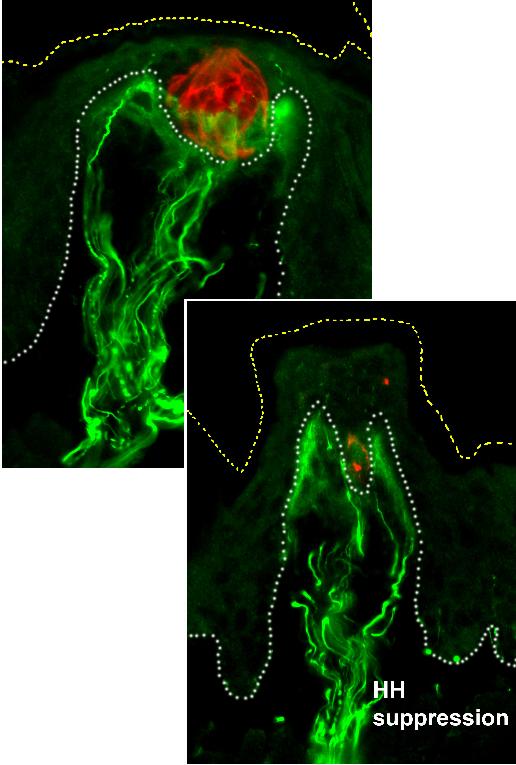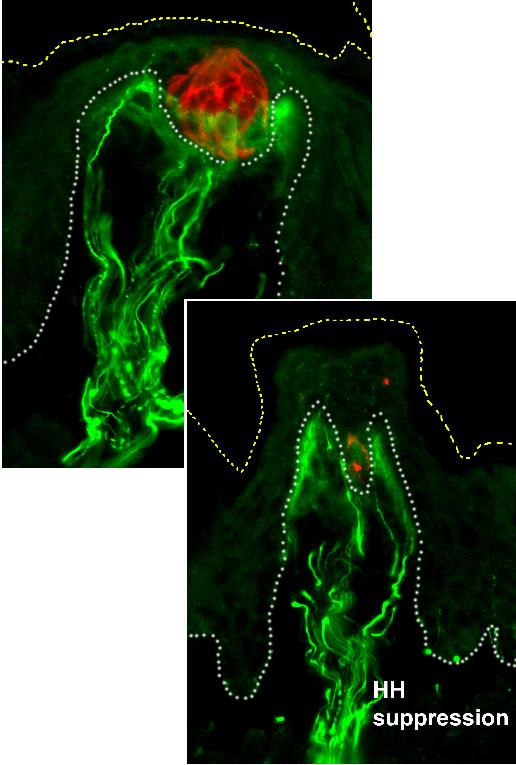
Credit: Charlotte M. Mistretta and colleagues.
Disruptions in the Hedgehog signaling pathway can interfere with taste bud maintenance in mice, potentially explaining why some cancer patients experience a loss of taste during treatment with Hedgehog-blocking drugs. Charlotte Mistretta and Andrzej Dlugosz of the University of Michigan in Ann Arbor, with colleagues, report these findings November 28th in PLOS Genetics.
To keep one's sense of taste, the taste buds and specialized mounds of tissue they reside in, called taste papillae, must be constantly renewed, with taste bud cells lasting an average of just 10 days. Scientists investigated the role of the Hedgehog signaling pathway, an important regulator of development and cell differentiation, in maintaining the dynamic taste buds and papillae. They used a panel of mouse models that enabled them to block, in some cases reversibly, regulatory GLI proteins that are responsible for Hedgehog-driven changes in gene expression. When the Hedgehog pathway was inhibited, taste buds rapidly disappeared and papillae lost their characteristic shape, even though the taste nerves were still present. Once Hedgehog signaling resumed, a significant fraction of the taste buds regenerated.
The study may help explain a common side effect in cancer patients treated with drugs that block the Hedgehog pathway. These individuals often report a loss of taste which gradually returns after treatment is stopped. Preventing the disappearance of taste buds during Hedgehog pathway blockade might reduce the taste loss experienced by these patients. These results raise the possibility that other conditions associated with a taste disturbance may also be explained by changes in the Hedgehog pathway.
Andrzej Dlugosz and Charlotte Mistretta say "We're pretty excited about these results because they provide the first genetic evidence that Hedgehog signaling is essential for taste bud maintenance in adult animals. Also, with the types of mouse models we used, we can now say that the critical site for Hedgehog signaling in taste organ maintenance is within epithelial cells of the taste papillae, where taste buds reside. If our results in mice reflect what happens in cancer patients who lose their taste when taking Hedgehog pathway inhibitors, it might be possible to get around this side effect if we can find a way to protect taste buds from the effects of the drug. Further, because the sense of taste is so central in our everyday lives for food choices and pleasurable aspects of eating, understanding how taste organ homeostasis is regulated significantly advances our understanding of sensory biology."
###
In your coverage please use this URL to provide access to the freely available article in PLOS Genetics: http://journals.plos.org/plosgenetics/article?id=10.1371/journal.pgen.1006442
Citation: Ermilov AN, Kumari A, Li L, Joiner AM, Grachtchouk MA, Allen BL, et al. (2016) Maintenance of Taste Organs Is Strictly Dependent on Epithelial Hedgehog/GLI Signaling. PLoS Genet 12(11): e1006442. doi:10.1371/journal.pgen.1006442
Funding: This work was supported by NIH National Institute on Deafness and Other Communication Disorders (NIDCD) NIH NIDCD Multi PI R01 DC0114428 to BLA, AAD, CMM; NIH National Institute on Deafness and Other Communication Disorders (NIDCD) NIH NIDCD DC00456 to CMM; NIH National Institute of Arthritis and Musculoskeletal and Skin Diseases (NIAMS) NIH R01 AR045973 to AAD; NIH National Cancer Institute (NCI) NIH P30 CA046592 to AAD; NIH National Cancer Institute (NCI) NIH R01 CA198074 to BLA; NIH National Institute on Deafness and Other Communication Disorders (NIDCD) NIH F31 DC013496 to AMJ; University of Michigan Center for Organogenesis Postdoctoral Fellowship to AK; (University of Michigan Center for Organogenesis Research Team Award to BLA, AAD, CMM; University of Michigan M-Cubed Program Team Awards to BLA, AAD, CMM. The funders had no role in study design, data collection and analysis, decision to publish, or preparation of the manuscript.
Competing Interests: The authors have declared that no competing interests exist.
Media Contact
Charlotte M. Mistretta
[email protected]
############
Story Source: Materials provided by Scienmag




